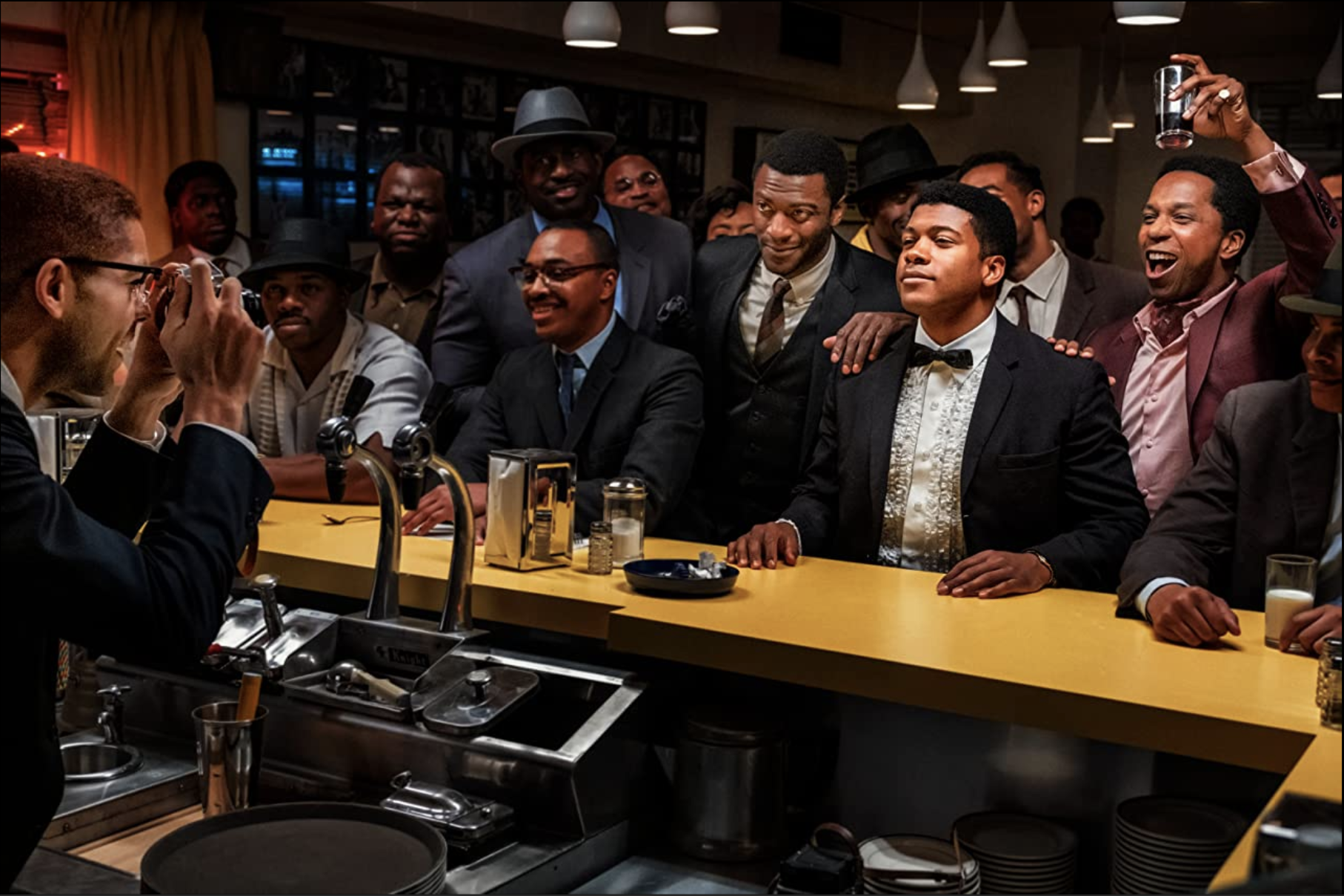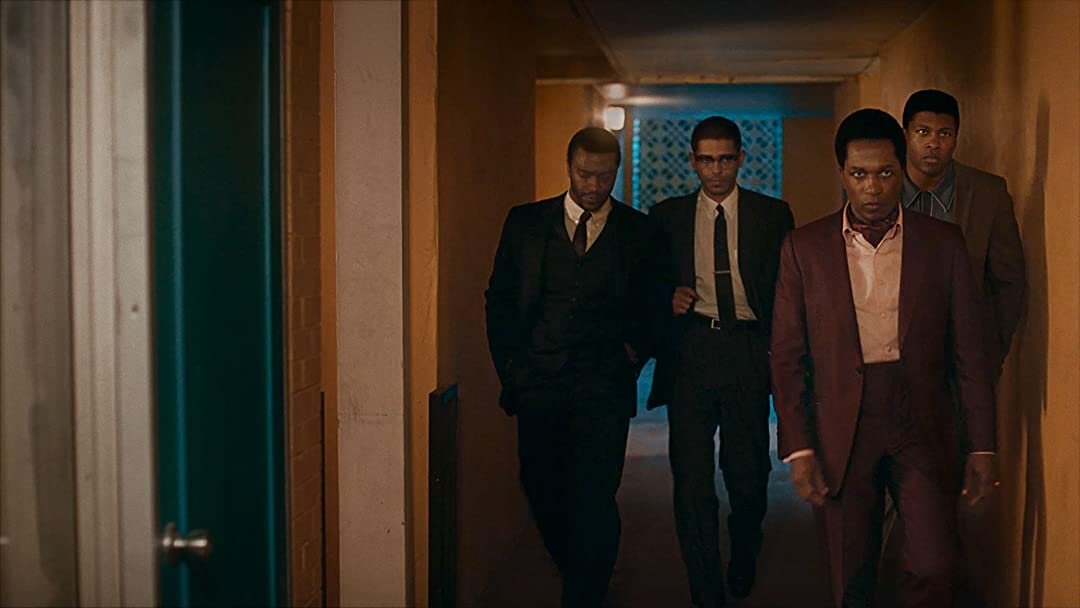Why “One Night In Miami” Is Simply Cathartic
Aldis Hodge, Leslie Odom Jr., Eli Goree, and Kingsley Ben-Adir in One Night in Miami (2020). Photo by Patti Perret.
This year the most tumultuous January in recent American history was blessed by the well-anticipated release of Regina King’s directorial debut of One Night in Miami. The film is an adaptation of the stage-play directed and written by Kemp Powers (writer of Pixar’s Soul). The film relays a fictional meeting between Muhammad Ali (Eli Goree), Jim Brown (Aldis Hodge), Sam Cooke (Lesley Odom Jr), and Malcolm X (Kingsley Ben-Adir) following Ali’s win against Sonny Liston. Confined mostly to a single motel room, their evening is marked by emotional exchanges between the men surrounding faith, Blackness, and the lingering question: “Am I doing enough?”
Firstly, to speak in praise of the film’s aesthetic beauty, both the camera work and set design contribute to making this film a gorgeous step outside of a time machine. Shot on an Arri Alexa, the 2.39 : 1 aspect ratio achieves the essence of a pre-digital classic film. This reminds us that we are guests in a moment of history marked by its signature style and fashion. The costuming and set design present beautifully, offering a nostalgia similar to my grandma’s old Polaroids.
Of the film’s most notable strengths, however, is its refreshing departure from recent trends in Black historical filmmaking. In recent years, Hollywood has seen an influx in Black historical films. Films like Ray, Selma, and Get On Up have acted as oftentimes the only means of seeing Black stories valued and discussed on a larger platform. However, with the inherent whiteness of Hollywood and the importance of marketability, these stories are oftentimes directed in a Wiki-page-style fashion that caters to whiter and wider audiences that may have not engaged with these stories before, detailing a figure’s, birth, death, career, and hobbies in a fast-paced and oftentimes disorienting manner.
This was not present in ONIM. The film is designed for audiences that know the history of these people. The tension of the film is rooted in already knowing their fate and motivations and not having it explained. This knowing is almost a character itself as you brace yourself at the sight of unguarded doors and windows. By removing these refresher lessons of racism and the Nation of Islam, the film delivers a call to action to audiences to fill in their own gaps on their own time.
It also humanizes these legends and zeroes in on the meaning of history rather than the historical film genre’s obsession with force-feeding facts. This is seen primarily with Muhammad Ali’s character. The film does a terrific job of highlighting his unique bravado and charm, paying homage to iconic photographs like the one of him boxing in a swimming pool.
Flip Schulke’s photograph of Cassius Clay a.k.a Muhammad Ali in top photo (1961). Eli Goree in One Night in Miami in bottom image (2020).
The film intentionally lingers here in these moments simulating a familiar snapshot of his relentlessness and strength. But the audience is quickly pulled back into his completely polar reality when he emerges from the water to defend his faith and needlessly explain his unwillingness to appease his white racist audiences. This is also present in smaller, gentler moments. When he arrives at Malcolm X’s motel room we see the loving mentorship between the two as they pray together. Malcolm X adjusts Ali’s hands to rest in the right fashion as Ali peeks between his eyelids like a child to be sure he’s praying correctly.
By stripping away the dehumanizing and oftentimes white-washed fame of these men, we are able to focus on the common fears and threats that they face as Black men. Jim Brown, though regarded as a “credit to the state of Georgia” is not allowed to enter a white man’s home to move furniture. Malcolm X deals with the constant fear of threats to his family and the desire to be seen as Black enough. Sam Cooke struggles with his choices to record palatable pop over more racially conscious songs. They all struggle to answer for themselves if they are doing enough for the movement against white oppression.
It is strange for me to find solace in a film of this kind. In a year that needs no further attention from my keyboard, the notion of settling in to watch a film about an America that I sadly recognize all too well seems almost sadistic.
Kingsley Ben-Adir in One Night in Miami (2020)
However, I find this film nothing but cathartic. The final scene of Sam Cooke anxiously performing “A Change is Gonna Come”, Ali nervously announcing the change of his name in front of a crowd of proud Black faces, and Malcolm X completing his final manuscript brought tears to my eyes. Though I know the fate of each of these men this scene filled me with a combination of bizarre hope and desolation. I took these moments as representing these men fully accepting uncertainty and fear but choosing to face it and ‘do the work’ in their best manner.
Sadly, today we still do not have answers to many questions presented in the film. I myself am only a year older than Ali was during this time. However, I find some semblance of peace in knowing that there is a community of other Black people that don’t have the answers either. Right now, it is very easy to feel like you haven’t read enough or donated enough.
However, this is to not discredit the moments of bravery we take in choosing to do anything at all. This movie should be a charge to Black and non-Black people to tangibly engage and keep doing the work and the research however hard that may be.




